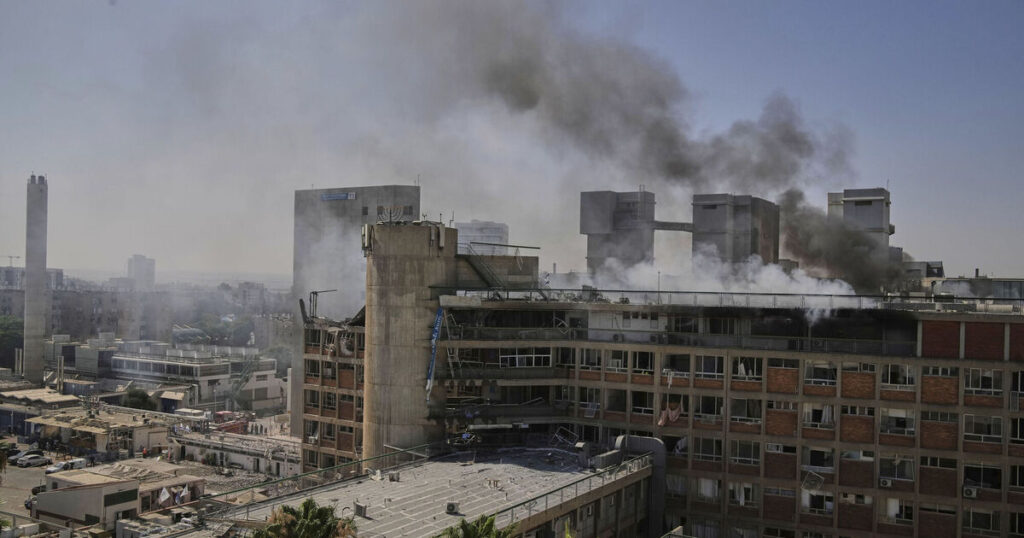US President Donald Trump has set a two-week deadline to decide whether the US will join Israel’s war with Iran, allowing time to seek a negotiated end to the conflict, the White House has said.
The decision to leave a window for diplomacy came after Israel’s defence minister openly embraced regime change in Tehran as a war aim.
On a visit to a hospital hit by an Iranian missile, Israel Katz said Iran’s supreme leader, Ayatollah Ali Khamenei, “cannot be allowed to exist” and that he had ordered a surge in attacks to “undermine” the Iranian government.
The Israeli prime minister, Benjamin Netanyahu, later insisted that toppling Iran’s leaders was “not a stated or formal goal”, as the conflict entered its seventh day.
The White House said on Thursday that the US president would “make a decision on whether to attack Iran within two weeks”. It added that correspondence with Tehran had continued and there was still hope of negotiations.
Trump’s decision on whether to join the assault against Iran hinged in part on whether America’s most powerful conventional “bunker buster” bombs would be able to take out Iran’s most heavily protected nuclear facility, sources familiar with the deliberations said.
Israel does not have weapons capable of destroying the Fordow complex, which is buried up to 100 metres below a mountain near the holy city of Qom. Netanyahu and his allies have been encouraging the US to shift from backing Israel’s defence to joining the attack, telling Trump that he alone can “finish off” Iran’s nuclear project.
Strike plans have been drawn up, but Trump is waiting to see if Tehran will make a last minute deal to abandon its nuclear programme, sources said.
Amid global warnings against further escalation, Europe is pushing for a diplomatic solution to the war. Iran’s foreign minister is travelling to Geneva to meet his British, French and German counterparts on Friday. There have also been offers of mediation from the Russian president, Vladimir Putin, and regional powers including Oman.
When Israel launched the conflict a week ago, Netanyahu described it as a focused operation to halt Iran’s progress towards making a nuclear bomb, but he has been increasingly vocal about his desire for the government in Tehran to fall.
On a visit to the Soroka hospital in Beersheba on Thursday, after it was hit by an Iranian missile overnight, Netanyahu said Israel was creating conditions for regime change but that Iranians needed to rise up.
Referencing a story from the Bible about the Persian emperor Cyrus the Great liberating Jewish people enslaved in Babylon, Netanyahu told journalists: “Today, a Jewish state is creating the means to liberate the Persian people.”
Netanyahu later said the fall of the Iranian regime was for the country’s people to decide. “It could be a result, but it’s not a stated or formal goal that we have,” he told Israeli public broadcaster Kan.
Iranians have repeatedly attempted to topple or reform their government over decades, and thousands have paid with their lives or freedom.
Many opposition figures, including political prisoners, have rejected the idea that an Israeli war which has already killed hundreds of civilians represents a path to liberation for their country.
They have a grim warning in the fate of neighbouring Iraq after US forces toppled Saddam Hussein. His downfall was celebrated by many Iraqis, but was followed by decades of extreme and often sectarian violence which paved the way for the rise of Islamic State.
Katz visited Soroka hospital before Netanyahu and effectively called for Khamenei’s assassination. He had earlier said he ordered increased attacks on government targets to undermine the regime.
“Khamenei openly declares that he wants Israel destroyed, he personally gives the order to fire on hospitals. He considers the destruction of the state of Israel to be a goal,” Katz told journalists. “Such a man can no longer be allowed to exist.”
After its initial focus on military and nuclear sites, Israel recently attacked targets, including the state broadcaster, with no links to the nuclear project, but which Katz described as “symbols of the regime”.
Iran’s early morning hit on Soroka hospital in Beersheba did not cause any serious injuries because all staff and patients were in protected areas, the director, Shlomi Kodesh, said.
But images of shattered wards and stunned medics examining the damage caused outrage in Israel.
Other missiles landed around Tel Aviv, injuring more than 200 people across the country as a whole, four of them seriously.
One hit the base of a skyscraper in Ramat Gan, close to central Tel Aviv and about 200 metres from the city’s diamond exchange.
“It was like an atom bomb. An earthquake,” said Asher Adiv, 69, who lives in a nearby block of flats. His mother was an Iranian Jew from Isfahan and Asher grew up speaking Farsi.
“The Iranian people should make a revolution, and kick out the ayatollahs,” he said. “We are not just fighting for Israel. We are fighting for the whole world. We ask Trump to go inside and finish the problem.”
Trump, who initially distanced himself from the conflict, has increased the US military presence in the region as he weighs up ordering US forces to join attacks on Iran.
Khamenei warned on Wednesday that the US would face “irreparable damage” if it shifted from supporting Israel’s defence to an active role in assaults on its territory.
Iran’s military has moved missiles to prepare for attacks on US assets if it joins the war, and officials are considering other options to respond to one of the most serious threats since the 1979 revolution that brought the country under the control of clerics.
Several countries are preparing to evacuate their citizens from Iran and Israel, while flights to bring back tens of thousands of Israelis stranded outside the country get under way. Israel’s main airport has been closed since the first attacks on Iran.
–


